Key takeaways:
- Ethical failures in media often arise from prioritizing speed over integrity, leading to the compromise of factual reporting.
- The media’s role in politics involves not only reporting but also acting as a watchdog, which can sometimes blur the lines between scrutiny and bias.
- Building a culture of ethics requires transparency, open discussions about ethical dilemmas, and recognition of ethical behavior within teams.
- Engaging in collective dialogue and ongoing training can help journalists strengthen their commitment to ethical standards.
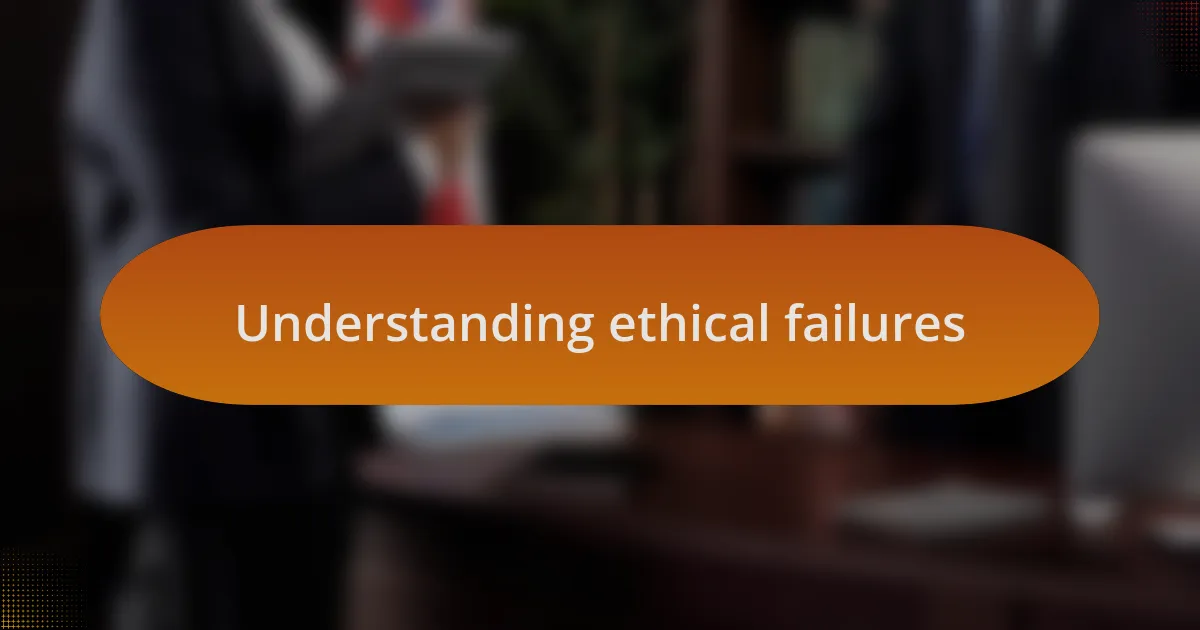
Understanding ethical failures
Ethical failures often stem from a disconnect between one’s values and actions. I recall a time when a colleague faced backlash for publishing a story without fully verifying the sources. It made me wonder: how often do we prioritize speed over integrity in the race for headlines?
Navigating ethical dilemmas isn’t always straightforward. For instance, I’ve participated in discussions where the pressure to toe the party line led to compromising our reporting standards. Reflecting on that experience, I felt a profound conflict, questioning whether we were truly serving the public or merely fueling a narrative.
Moreover, ethical failures can manifest in subtle ways that might not always seem like failures at first glance. I once found myself in a situation where sensationalizing a minor detail seemed harmless at the moment, but in retrospect, it misrepresented the story’s essence. This brings to mind the question: can we ever fully recover once trust is compromised?
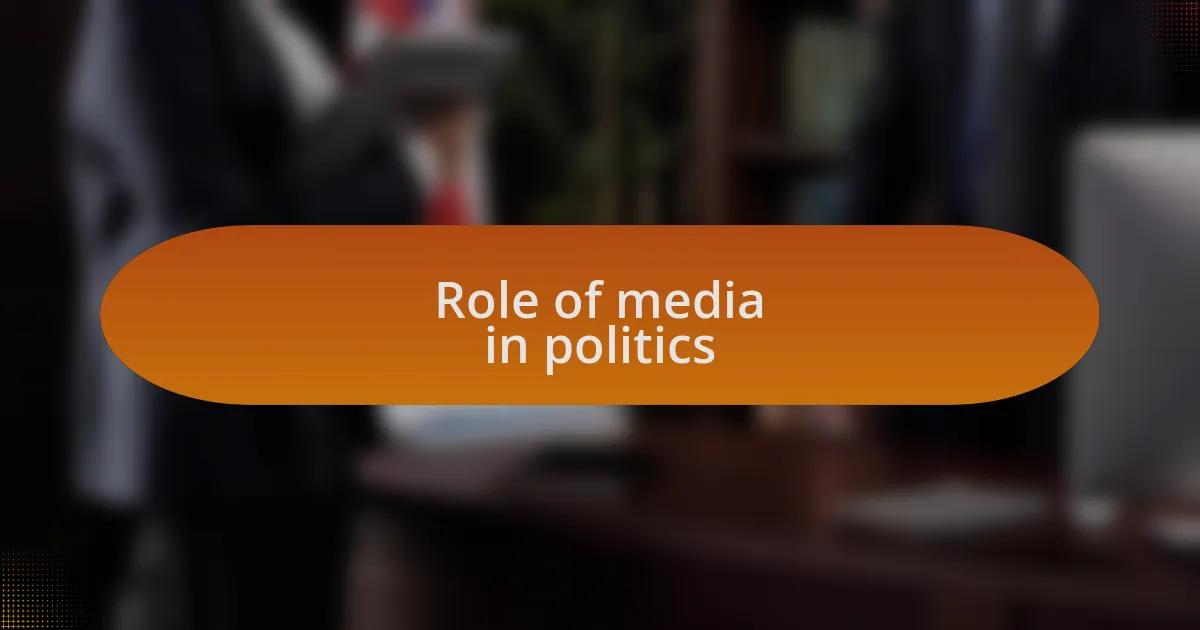
Role of media in politics
Media serves as a powerful tool in shaping political discourse and influencing public perception. I remember a time when a particular news segment about an election debate emphasized emotional drama over factual analysis, leading viewers to form opinions based on sensationalism rather than substance. This experience highlighted how easily the media can distort reality, compelling me to reconsider the responsibility we hold in presenting information.
One of the most significant roles media plays in politics is acting as a watchdog. During my years in the field, I witnessed investigative journalism uncover systemic corruption, which almost felt like a beacon of hope for the community. Yet, it raises the question: how often do we recognize the fine line between scrutiny and bias? In striving for accountability, it’s crucial to ensure that our coverage doesn’t inadvertently skew narratives for political gain.
Moreover, media has the ability to amplify marginalized voices, fostering a more inclusive political landscape. I recall a podcast series that featured stories from underrepresented communities, allowing their struggles and triumphs to resonate with a wider audience. This experience reminded me of the importance of giving a platform to those often silenced in mainstream narratives, yet I wondered: can we genuinely advocate for diversity while grappling with our own biases in reporting?
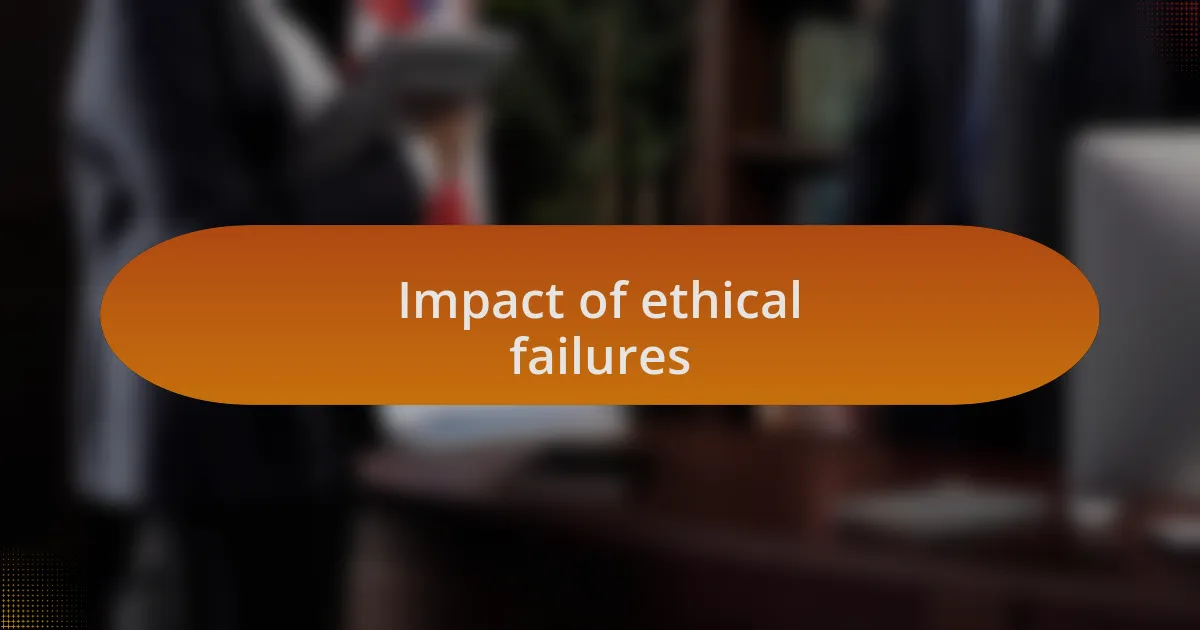
Impact of ethical failures
Ethical failures in media can have profound ramifications that extend far beyond the newsroom. I once worked on a story that, although impactful, faced backlash due to a lack of careful fact-checking. This negligence not only damaged the credibility of our publication but also sowed distrust among our audience; it made me realize how quickly misinformation can undermine the public’s faith in media.
I remember a colleague who reported on a highly sensitive political issue without considering the ethical implications of her sources. The fallout was immediate, leading to widespread outrage from the community and significant reputational damage for our organization. It made me question: how can we ensure our commitment to ethical practices when the pressure to deliver breaking news looms over us?
When ethical standards falter, the consequences ripple through society. I reflect on an incident where a sensationalized report led to public panic over a political event that was later debunked. This experience left me feeling frustrated, prompting me to ask: What responsibility do we have in preventing such chaos? The reality is that ethical failures not only affect media credibility but can also distort reality in ways that mislead and harm audiences.
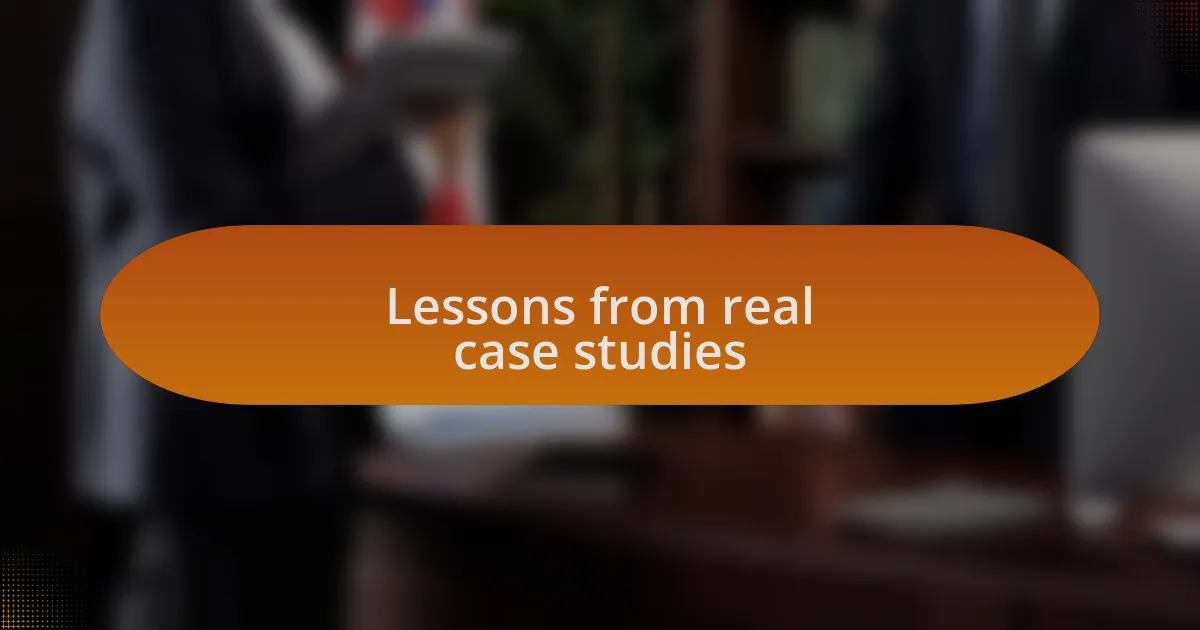
Lessons from real case studies
When examining specific instances of ethical failures, I recall a high-profile case where a prominent news outlet ran a story based on anonymous sources that later proved unreliable. The outrage was palpable; readers felt betrayed, raising questions about how well we vet our sources. It made me realize the importance of transparency in our reporting, leaving me wondering: How do we rebuild trust once it’s been shattered?
I also think about a scandal involving a journalist who manipulated footage for dramatic effect. The fallout was not just a personal disgrace; it tainted the credibility of her entire newsroom. It struck me hard, prompting me to consider: Are we, as journalists, sometimes too focused on clicks and ratings to remember our real mission of informing the public accurately?
Another case that comes to mind involved a misrepresentation of voter behavior during an election cycle, which led to heightened tensions in the community. The backlash was immediate and severe, and I found myself reflecting on my own reporting practices. I asked myself: How can we prioritize ethical integrity while striving to engage our audience? It’s crucial to ensure that our narratives reflect reality, not sensationalism, to truly serve the public good.
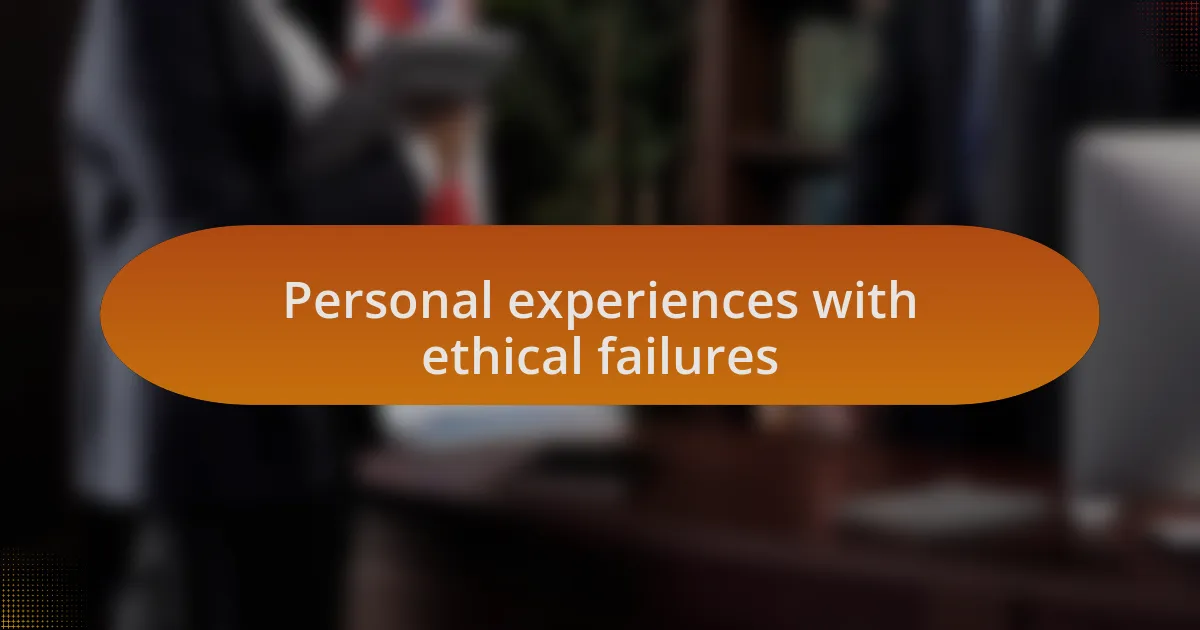
Personal experiences with ethical failures
I once faced an ethical dilemma when I covered a local protest. My excitement to capture the story led me to overlook some crucial context, painting a skewed picture of the event. I later learned that my portrayal fueled division rather than understanding, making me question: How often do we let our narrative preferences overshadow the truth?
During a political campaign, I encountered a situation where I had access to a scandal that could change voter perspectives. Despite the potential impact, I chose to sit on that information because it wasn’t thoroughly verified. The weight of that decision hung over me as I reflected on whether I was truly upholding my responsibility as a reporter, or just playing it safe.
Moreover, I remember mistakenly using a graphic that sensationalized a tragic event, thinking it would grab attention. The backlash from the community was swift, and I felt a deep sense of regret. It made me ponder: In our quest for engagement, are we sometimes forgetting the human stories behind the headlines? That’s a question I carry with me every day.
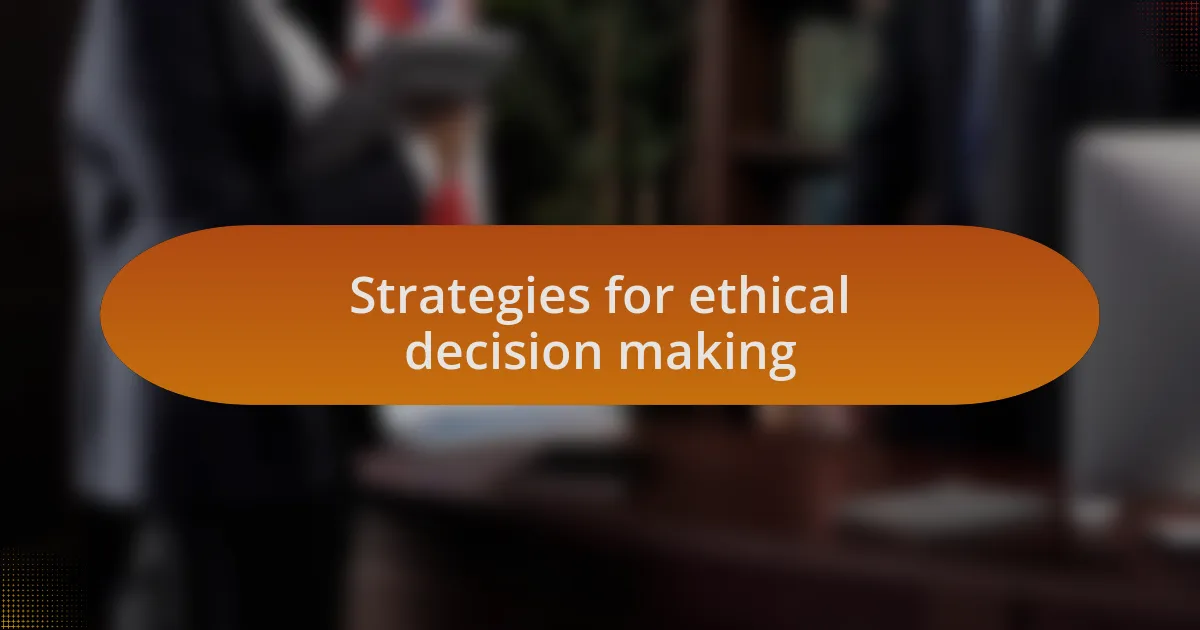
Strategies for ethical decision making
One effective strategy for ethical decision making involves a commitment to transparency. I recall a situation where I had to decide whether to disclose my personal biases while reporting on a contentious issue. By choosing to be open about my perspective, I not only fostered trust with my audience but also allowed for a more honest discussion about the topic at hand. Isn’t it remarkable how transparency can bridge gaps rather than widen them?
Another approach is to develop a robust ethical framework that serves as a guide during challenging moments. I remember facing pressure from a colleague to cover a story that veered into sensationalism. By reflecting on my established ethical principles, I stood firm and opted for a more balanced narrative. This experience reaffirmed my belief that having a clear set of guidelines can empower us to make decisions aligned with our values, even when the stakes are high.
Lastly, engaging in open dialogue with peers regarding ethical dilemmas can offer fresh perspectives and insights. I once participated in a roundtable discussion where we shared our individual experiences with ethical lapses. Hearing different viewpoints not only illuminated potential pitfalls but also reinforced the importance of collaboration in cultivating ethical journalism. Have you ever considered how collective wisdom can strengthen our moral compasses when navigating complex issues?
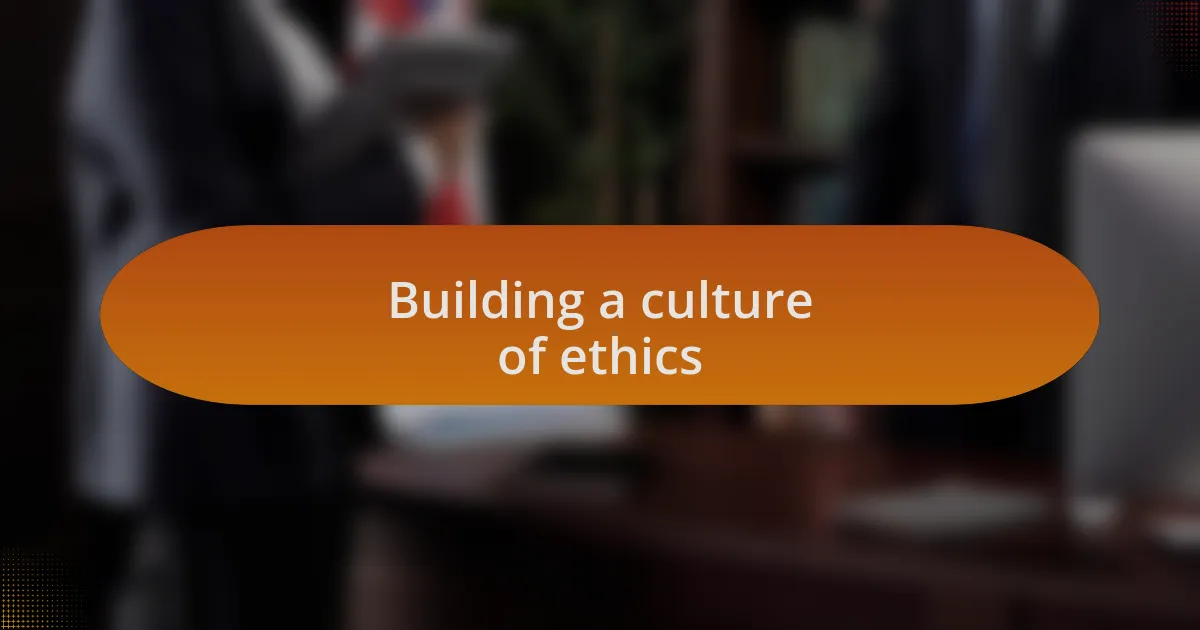
Building a culture of ethics
Creating a culture of ethics starts with establishing core values and openly discussing them. I once joined a team where we dedicated part of our meetings to discussing ethical scenarios, like the delicate balance between privacy and public interest. It was eye-opening to see how different opinions emerged, and I felt a genuine sense of camaraderie as we collectively articulated our commitments. How often do we create safe spaces to confront these discussions?
Moreover, recognizing and rewarding ethical behavior is crucial in building that culture. I can think of a time when a colleague made a significant personal sacrifice to ensure the truth was reported accurately. The respect and gratitude from our team not only validated their choice but also set a powerful example for others. Isn’t it inspiring when we acknowledge those who hold steadfast to their principles, reinforcing that integrity truly matters?
Finally, ongoing training and mentorship can reinforce ethical standards within an organization. In my previous role, we implemented regular workshops designed to address emerging challenges in media ethics. I found that these sessions didn’t just inform; they sparked passionate discussions that kept ethics at the forefront of our daily practices. How can we ensure that everyone feels equipped to make ethical decisions, regardless of their experience level?